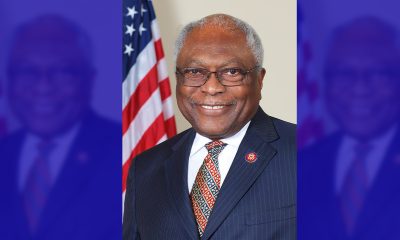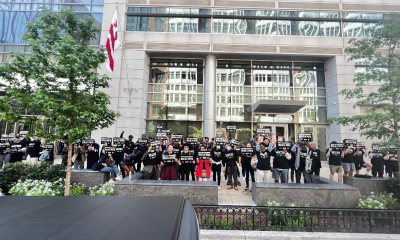Defender News Network
Auto loan delinquencies climbed to $9 billion in 2018
DEFENDER NEWS NETWORK — New data from the Federal Reserve Bank of New York, offers hard evidence that a key sector of the economy is showing signs of distress: auto loans
In recent months, many economists and lawmakers have frequently touted how the nation’s economy is performing really well. Often citing historically low unemployment rates, I’ve always felt that such pronouncements failed to consider the untold millions of Americans who are eking out a living on low or no raises, or others who work multiple jobs trying to piece together a living for their families.
But new data from the Federal Reserve Bank of New York, offers hard evidence that a key sector of the economy is showing signs of distress: auto loans. At the end of 2018, 7 million consumers were three months behind on their car payments, according to the Fed’s Liberty Street Economics.
Addressing its finding of multi-million auto loan delinquencies, the Fed wrote, “That is more than a million more troubled borrowers than there had been at the end of 2010 when the overall delinquency rates were at their worst since auto loans are now more prevalent.”
I suspect that many consumers want to keep a car available just as much as a roof over their heads. Reliable wheels also offer a certain amount of freedom of mobility that eliminates the need to know a train or bus route or the fare.
So why are so many consumers delinquent on their car loans?
Answers can be found by examining the terms of the loans. Just as the foreclosure crisis took people’s homes, the wrong car loan takes your mobility. Consumers with lower credit scores – less than 620 on a scale that reaches 850 – become easy targets for sub-prime auto finance that comes with interest rates from the mid-teens to as high as 20 percent. Auto finance companies are often used by lower credit score consumers looking to buy a car.
By comparison, consumers with credit scores of 661 to 780 or higher typically have car loan interest rates of 6 percent or less. These consumers frequently finance their autos from banks, credit unions, or the financing arms of major auto manufacturers. Of the nation’s $1.27 trillion in car loan debt, 30 percent of loans were made to consumers with credit scores over 760.
As Liberty Street reports, 6.5 percent of auto finance loans are 90 days or more past due, compared with only 0.7 percent of loans originated by credit unions. So unfortunately once again it is the struggling, working poor who are bearing the brunt of car loan delinquencies, often forged by predatory high-interest rates and other practices.
Another new and independent research report entitled, Driving Into Debt, found that the money now owed on cars is up 75 percent since the end of 2009, an all-time record. Jointly authored by U.S. Public Interest Research Group (US PIRG) and the Frontier Group, this report states that subprime auto lenders inflict financial abuses that are both predatory and discriminatory from making loans to people without the ability to repay, marking up rates and prices on both Black and Latino customers, and financing expensive add-on products like extended warranties and insurance into the car loans.
“Americans shouldn’t have to fight their way through a thicket of tricks and traps at the auto dealer just to get the transportation they need to get to work or school,” said Ed Mierzwinski, U.S. PIRG’s senior director for federal consumer programs and a report co-author.
Nor does it help that in April of last year, Congress used the Congressional Review Act to nullify the Consumer Financial Protection Bureau’s (CFPB) auto finance guidance that held auto lenders responsible for discriminatory lending practices prohibited under the Equal Credit Protection Act. This distorted use of the Congressional Review Act, sometimes known as another CRA, was never intended to overturn long-standing agency practices.
But in 2018, the law was used to overturn 14 agency rules. At the time, Senate Majority Leader Mitch McConnell described the auto lending CRA as part of a broader deregulation effort, stating: “Our whole economy is getting a tune-up. And now it’s time for the front end of the auto industry to come along for the ride.”
That kind of perspective suggests that the Majority Leader may have an unhealthy regard for fair lending laws, particularly those aimed at eliminating racial and ethnic discrimination. Further, time and actions will tell how much Kathy Kraninger, the new CFPB Director, is attuned to the predatory and discriminatory lending that continues despite federal laws.
“We need a strong Consumer Financial Protection Bureau and help from state Attorneys General and local officials to enforce consumer and fair lending laws against unfair car loan tactics,” added Mierzwinski. “Otherwise, consumers and the overall economy will suffer.”
“Predatory and discriminatory auto lending practices notoriously prey upon the financially distressed, with loans that disregard the consumer’s ability to afford them,” noted Rebecca Borne, a Senior Policy Counsel with the Center for Responsible Lending. “Common-sense regulation and enforcement are needed to ensure responsible underwriting and elimination of other predatory practices that are consistently shown to result in borrowers of color paying more than white borrowers, even controlling for creditworthiness.”
This article originally appeared in the Defender News Network.
#NNPA BlackPress
Philadelphia honors Patti LaBelle with a street – but spells her name wrong
DEFENDER NEWS NETWORK — Philadelphia honored singer Patti LaBelle with her very own street earlier this week. Unfortunately, the signs didn’t get her name right. The city’s Streets Department didn’t capitalize the “b″ in the legendary soul singer’s last name on the signs that were put up before Tuesday’s ceremony on Broad Street. A stretch between Locust and Spruce streets was renamed “Patti LaBelle Way” in honor of the Philadelphia native.
By Defender News Service
Philadelphia honored singer Patti LaBelle with her very own street earlier this week. Unfortunately, the signs didn’t get her name right.
The city’s Streets Department didn’t capitalize the “b″ in the legendary soul singer’s last name on the signs that were put up before Tuesday’s ceremony on Broad Street. A stretch between Locust and Spruce streets was renamed “Patti LaBelle Way” in honor of the Philadelphia native.
City spokeswoman Deana Gamble tells The Philadelphia Inquirer the city is aware of the error and plans to install signs with the correct capitalization next week.
A sign that LaBelle autographed and held during the ceremony had the correct spelling.
She thanked all the fans who came out to the ceremony and reminisced about her parents walking down that very stretch of Broad Street.
This article originally appeared in the Defender News Network.
#NNPA BlackPress
Lee Daniels to briefly resurrect his cancelled ‘Star’ drama series
DEFENDER NEWS NETWORK — Following news that the Fox Network cancelled the music drama Star after three seasons, comes word from producer Lee Daniels that the series will be making a comeback as a televised movie.
By Defender News Service
Following news that the Fox Network cancelled the music drama Star after three seasons, comes word from producer Lee Daniels that the series will be making a comeback as a televised movie.
“The bad news is that ‘Star’ is not getting picked up for series,” Daniels says in an Instagram video post recently, which he captioned “Get ready for a two-hour gag!!”
In the clip, he calls the circumstances surrounding the cancellation “too long of a story to cry about.”
“The good news is: we’re doing a movie of the week to wrap things up for you all,” he says.
As was previously announced, fans were rocked by the news of the Empire spin-off getting the ax, especially seeing as how the season three finale ended on a jaw-dropping cliffhanger. The last episode aired Wednesday (May 8), just two days before the cancellation announcement.
At the time, Daniels said he was attempting to shop the series to other networks, but his efforts proved fruitless, as noted by TheWrap. Now the Oscar nominee vows to “make something real special for you to scream about with all of our cast members, even the dead ones.”
Daniels did not say when or on which network the two-hour Star movie will air, although it’s being assumed that the tele-film will be on Fox, which is also wrapping up Daniels’ Empire musical drama series next year. Reps for the network have not yet responded to requests for comment about Star’s resurgence.
The Atlanta-based Star follows the journey of three young women who form a musical group and navigate the ruthless business on their way to success. The cast features Jude Demorest, Ryan Destiny. Brittany O’Grady, Queen Latifah and Benjamin Bratt.
The sitcom averaged 3.5 million viewers for Season 3, compared to Season 2’s 4.1 mill, and hit a series low as recently as May 1, according to TVLine.
This article originally appeared in the Defender News Network.
Defender News Network
With conflicting budget estimates, will Texas teachers get the pay raises they anticipated?
DEFENDER NEWS NETWORK — When state lawmakers passed their landmark $11.6 billion school finance law in late May, school employees were eager to see how mandatory raises would affect their paychecks. A month later, they’re scratching their heads, struggling to decipher complicated changes and conflicting financial estimates that might not net teachers as much money as they expected.
By Defender News Service
When state lawmakers passed their landmark $11.6 billion school finance law in late May, school employees were eager to see how mandatory raises would affect their paychecks.
A month later, they’re scratching their heads, struggling to decipher complicated changes and conflicting financial estimates that might not net teachers as much money as they expected.
Before lawmakers voted nearly unanimously to approve House Bill 3, which drastically overhauled Texas’ outdated school funding system, they received estimates from the state on how much additional money each of their school districts would likely receive over the next two years. But the estimates came with a warning: They could change significantly once the calculations were performed using local data.
Ahead of the upcoming school year, districts are now redoing those calculations themselves — and some are coming up short. That could pose a problem for teachers, nurses, counselors and librarians, since under HB 3, school districts are supposed to use a portion of the new money on those employees’ raises and benefits. (School boards must approve their budgets by either a June 30 or an Aug. 31 deadline.)
Georgetown ISD, for example, is projecting $5.9 million in new money in the upcoming school year, much less than the $10.3 million state estimate. And it will shell out about $9 million in recapture payments, which the state takes from wealthier districts to subsidize poorer ones — not the $3.5 million the state estimated in May.
Cypress-Fairbanks ISD, a large suburban district in the Houston area, should’ve expected $30 million more in the upcoming school year, according to the state estimates. But school board members approved a budget in late June that projected just $14 million more, according to Karen Smith, the district’s chief financial officer.
To remain competitive as employers, both districts are going beyond the state’s requirement to use 30% of the new money to increase salaries and benefits. Georgetown ISD is including $3,000 raises for teachers, counselors, librarians and nurses with more than five years of experience. Cypress-Fairbanks ISD approved a budget millions of dollars in the red that includes $25.4 million in raises for classroom teachers, librarians, counselors and nurses and $10.8 million in raises for all other employees.
Teacher pay raises quickly became a bipartisan rallying cry during the 2019 legislative session that finished up in May. But instead of the statewide $5,000 raise many teachers advocated for from the get-go, lawmakers approved a set of guidelines for salary bumps that would end up leaving the dollar amounts largely up to district leaders.
There is not yet an official statewide summary on what compensation packages look like across school districts, but eventually districts will be required to report that information to the Legislature. Meanwhile, the state has been providing guidance on how to interpret the new law through videos and PowerPoint presentations.
Without an across-the-board pay raise mandate from the state, teachers and other school employees have been looking left and right at neighboring school districts to judge how they’re going to fare. Some report having heard nothing from their school districts so far this summer, as they anxiously monitor the news from across the state.
Sunnyvale ISD Superintendent Doug Williams found that the state’s calculation for how much more his tiny school district would receive was pretty accurate: just under $600,000. But school districts in the vicinity, which include large, urban Dallas ISD, are getting millions more, meaning they’ll be required to offer bigger raises.
To stay competitive, Sunnyvale ISD’s school board approved larger pay raises than required by law, ranging from $1,800 for beginning teachers to $2,700 for the most experienced. “We have been blessed to be able to attract and retain great teachers,” Williams said. “We just want to make sure we are able to continue.”
In some school districts, local teachers’ unions and associations are butting heads with administrators as they advocate for higher raises and larger employer contributions to health insurance. After adopting a budget with 5% raises, Laredo ISD’s officials told frustrated teachers they are waiting for more guidance from the state before they consider raising salaries further.
In Houston ISD, the teachers union successfully threatened a no-confidence vote against the superintendent if trustees didn’t pass a budget with pay raises by later this month, arguing the delay would make them less competitive for hiring. After a contentious meeting, the board ultimately approved a deficit budget containing raises of 3.5% to 8%, depending on school employees’ experience levels. The budget also increased the minimum wage for school employees by $2 an hour.
For third grade writing teacher Huyenchau Vu, who watched the Legislature’s initial proposal for $5,000 raises dissolve, a 3.5% raise means a boost of less than $2,000 a year and less than $100 per paycheck. “It goes back into paying for everything, not necessarily into a savings account,” said Vu, who just finished teaching summer school at Houston ISD and will start her third year teaching in August.
She and her colleagues have been taking notes about the higher starting salaries and raises for Houston-area districts such as Aldine ISD and Alief ISD, but not necessarily because they’re trying to jump ship. While Vu would appreciate more money, she is also worried about the sustainability of the Legislature’s funding increase and is glad Houston ISD appears to be more “realistic” in its budgeting decisions than its neighbors.
“They’re paying their teachers a lot more knowing it’s just over the next two years that we’re receiving money from the state of Texas to put into these teacher salaries,” she said. “After that, no one’s sure what’s going to happen.”
This article originally appeared in the Defender News Network.
-

 Activism4 weeks ago
Activism4 weeks agoOakland Post: Week of March 27 – April 2, 2024
-

 #NNPA BlackPress4 weeks ago
#NNPA BlackPress4 weeks agoCOMMENTARY: D.C. Crime Bill Fails to Address Root Causes of Violence and Incarceration
-

 #NNPA BlackPress4 weeks ago
#NNPA BlackPress4 weeks agoFrom Raids to Revelations: The Dark Turn in Sean ‘Diddy’ Combs’ Saga
-

 #NNPA BlackPress4 weeks ago
#NNPA BlackPress4 weeks agoMayor, City Council President React to May 31 Closing of Birmingham-Southern College
-

 #NNPA BlackPress4 weeks ago
#NNPA BlackPress4 weeks agoBaltimore Key Bridge Catastrophe: A City’s Heartbreak and a Nation’s Alarm
-

 #NNPA BlackPress4 weeks ago
#NNPA BlackPress4 weeks agoBaltimore’s Key Bridge Struck by Ship, Collapses into Water
-

 #NNPA BlackPress4 weeks ago
#NNPA BlackPress4 weeks agoBeloved Actor and Activist Louis Cameron Gossett Jr. Dies at 87
-

 Community1 week ago
Community1 week agoFinancial Assistance Bill for Descendants of Enslaved Persons to Help Them Purchase, Own, or Maintain a Home






















































1 Comment